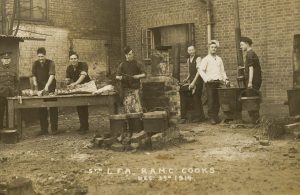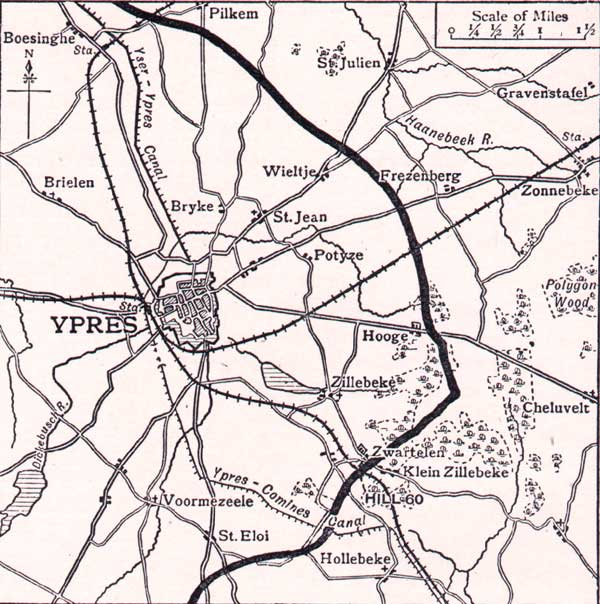15 Apr 2017
Posted by Dave under Dave's Thoughts,Family
Sgt John Blair
My grandfather, John Blair (1891 – 1978), was a soldier in the Great War in the British Army. Between watching the ceremony at Vimy last week, commemorating the 100th anniversary of the battle won by the Canadian Corps, and a comment made by my Dad that Grandpa had fought at Vimy I got to wondering about that story.
The story is, as with so many veterans, sparse on details. John Blair’s experiences during the war were just not discussed – no doubt a chapter in his life full of difficult experiences best not dwelt upon. In fact, during John’s lifetime the only time he talked about his service was in an audio interview that he did with the oldest of his grandchildren in 1977, just nine months before he passed away.
That interview focused on John’s recollections of stories of his parents and grand-parents, his earliest memories and his experiences through school, the war and emigrating to a farm on the Alberta prairies after the war ended. John was raised in Liverpool and, after finishing his schooling, became a clerk for the Great Northern Railway, first in Liverpool and later in London, where he lived when the war began. John’s description of how he enlisted is very matter of fact:
… Then the war broke out in 1914. When the call came because of the invasion of Belgium by the Germans, tens of thousands of us young fellows flocked to the coast. From then on, from 1914 to 1918, having done my training in London in the Royal Army Medical Corps, I was overseas.
His decision to enlist was speedy – Britain declared war on 4 August and John enlisted on 2 September of 1914.  At the time of the interview, John simply described his unit as “the Field Ambulance” and it was years before bits of documentation came to light in the family to start piecing together more details of his service in the 5th London Field Ambulance. There were a few months of training, first as a stretcher bearer then becoming one of the cooks for the unit (he is 3rd from the left in the picture), before shipping off to France in March of 1915. Once in France, he served a a cook for the unit September 1916 when he was promoted from Private to Sergeant. As an NCO he no longer cooked, but served in general duties and as a stretcher bearer.
At the time of the interview, John simply described his unit as “the Field Ambulance” and it was years before bits of documentation came to light in the family to start piecing together more details of his service in the 5th London Field Ambulance. There were a few months of training, first as a stretcher bearer then becoming one of the cooks for the unit (he is 3rd from the left in the picture), before shipping off to France in March of 1915. Once in France, he served a a cook for the unit September 1916 when he was promoted from Private to Sergeant. As an NCO he no longer cooked, but served in general duties and as a stretcher bearer.
From before the war, John had been courting Grace Hanley who lived in Liverpool – a courtship largely conducted by letters mailed back and forth over almost 8 years. Eventually, John married Grace Hanley in 1918 while on leave from his unit for ten days, returning to the front after a wedding and short honeymoon. In the audio interview, amid a series of questions about his correspondence by letter with Grace before and during the war, the conversation turns to some of John’s battlefield experiences as the reminiscence of the letter writing prompts a transition to memories of his service as a stretcher bearer.
76.Q. Did you write just as often during the War as you did before?
A. No. Obviously we were too busy and when we were up in the trenches you couldn’t. Sometimes up in the trenches it would be 24 hours before we could even go to sleep going up the line bringing out the stretcher patients.
Speaking about going up the line as a stretcher-bearer on one occasion we were in front of Cambrai. At about that time tanks were beginning to be introduced as a weapon of warfare. We were bringing a fellow out of the line and we had him up on our shoulders, instead of low down on what they called the traverse, or the handles. Over came a German plane and when he spotted us, he started to pepper us with his gun, with his machine gun. Fortunately, we were passing one of these abandoned tanks that had been knocked out. So we dived and put the stretcher in between the tracks of the tank, it was just wide enough and we ran the stretcher in between with the man on it and crawled in after it and waited until Jerry had gone back.
77.Q. Everybody came out of that OK?
A. Yes, we came out. On one occasion we were up at Ypres, in front of Hill 60. Here I see, looking back, the preserving hand of God upon me. I remember going up one time and, some of the boys were pretty civil-minded and real Christians, and I remember quoting a verse from the Psalms, “a thousand shall fall at thy right hand but it shall not come thy way”. I saw the evidence of that, on this particular occasion. When we were able in this instance to be able to run that wounded man on the stretcher in between the tracks of that abandoned tank.
British Salient round Ypres in 1916, Hill 60 and the rail line lower rightI remember, I’ll never forget, Christmas Eve of 1916. The mail used to come up with the rations. We were in a dugout under a railroad that ran from Ypres to Lille. It was a broad-gauge railroad, a single line. And we were just about going to have our tea and we had just opened our parcels from home. Just prior to that, foolishly, we had been walking, in daylight, outside the dressing station. A German plane had come over, unknown to us, and was taking observations and had spotted us outside this dugout . About just as it was getting dark and we’d made our tea and we were ready to have our tea and open our parcels. I went across the dugout; it was about 10 by 10, to get my cup out of my haversack to dip into the dixie to get my tea. At that precise moment when I moved two 6-inch shells came clean through that roof and from then on it was all oblivion. I was the only one that came out of there without a scratch ; one boy was underneath me and another was on top of me, with a concussion. One of the boys we never found until the next day, because he’d been blown clean up through the hole in the dugout.
78.Q. How many of you were there?
A. There was about eight of us in the dugout. I wasn’t injured physically, but I got shell-shock and for a little while I was taken out of the line and I was down to the ADMS Headquarters, that’s the Assistant Director, Medical Services and I did cooking for the staff down there.
79.Q. Was that early in the War?
A. 1916. After I’d recovered from shell shock I went back to the duty at the unit, with the London Field Ambulance . From then it was the same routine, it was stretcher-bearer up the line, up and down.
And that’s it – the only direct recollections recorded from John’s four-and-a-half years of wartime experience.
As for Vimy – we don’t have any direct stories or other information. But, John’s unit was attached to the 47th (2nd London) Division of the Territorial Force (one of 14 such infantry divisions in the “first line”). The 47th Division initially landed in Bethune, France and spent the war in northern France and Flanders (Belgium). In the first half of 1916 the division was in the area west of Vimy and took significant casualties (about 1500 of a total of 2500 British lost) in the German attack at Vimy Ridge on 21 May 1916. An abbreviated War Diary for the 5th London Field Ambulance is available online in the collection of the Wellcome Library as part of a unit history from 1935.
Comments Off on Sgt John Blair


